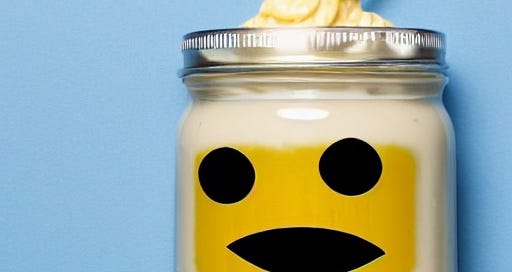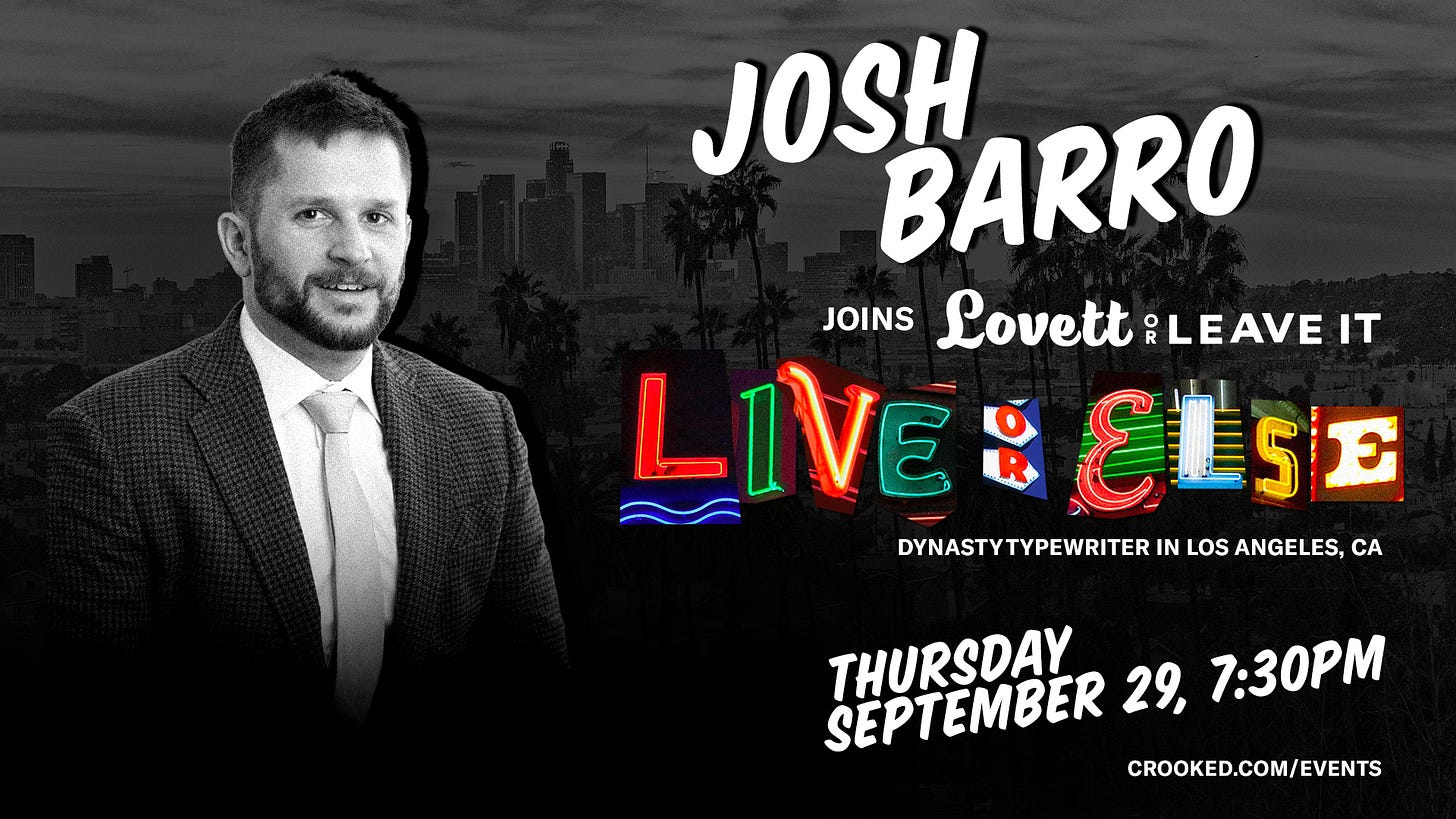This Week in the Mayonnaise Clinic: Sports Betting Should Be Inconvenient
Plus, who's more off-putting: Gavin Newsom or Justin Trudeau?
Dear readers,
This week’s Mayonnaise Clinic is coming to you from Los Angeles. Among other things bringing me to California, I will be on the Lovett or Leave It podcast tomorrow (Thursday) at Dynasty Typewriter in MacArthur Park. The show’s at 7:30pm and if you’re in LA and you’d like to come, you can get tickets here.
You’ll get to hear me talk about Gavin Newsom in his home state — where he should stay.
Okay, now the mail.
T. writes from right here in sunny California:
Your bit of gambling NIMBYism reminded me of the crazy ad war that’s going on out here in California between tribal groups and online sports betting companies over two dueling ballot questions about sports betting. In general, I’m a skeptic about making gambling more accessible, but I’m also a westerner and therefore a bit libertarian about these things. Are there any lessons to be learned from the handful of eastern states that have legalized sports betting?
As T. notes, Californians will vote this November on two competing1 proposals to legalize sports betting.
Proposition 26 would legalize sports betting at Indian casinos and racetracks.2 Notably, it would not allow sports betting online or at the numerous legal cardrooms located across the state, where poker can currently be played at many convenient locations in Los Angeles County and the Bay Area.
Proposition 27 would legalize online sports betting. Online sportsbooks would have to pay large upfront licensing fees to the state and partner with a California Indian tribe. Notably, the initiative would only permit an online sportsbook to operate in California if it already operates in at least 10 other states — a clever rule that helps ensure the large, national players funding the campaign for Proposition 27 wouldn’t face too much competition in California from new entrants.
Proposition 27 would make sports betting a lot more ubiquitous than Proposition 26. As is already the case in about half of states, people would be able to bet on their phones, from anywhere, and it’s therefore expected to raise a lot more money for the state than Prop 26. The billboards for Prop 27, which I keep seeing along freeways during this trip,3 simply say “fund permanent solutions for homelessness." The campaign's focus is not on sports betting but on the government revenue it would generate.
A free market in gambling creates similar issues to a free market in drugs: The most profitable customers are often the ones who are making the worst life decisions, and businesses, doing what they do best (refining their products and services to be as desirable as possible to consumers), end up encouraging problem behavior. And while the drug war is a nightmare, gambling prohibition is more workable — it doesn’t require mass incarceration, and while there is a lot of black-market gambling, it doesn’t come with nearly the same burden of ancillary crime and death that the illegal drug trade carries.
So basically, while I think legalizing marijuana has been clearly the correct policy choice even though legalization is increasing the amount of problem marijuana use, I’m more wary of gambling expansions, because the status quo of prohibition is so much more sustainable than it is with drugs.
Or at least, it should be sustainable. In practice, I expect almost every state to legalize sports betting, just like 45 states eventually decided to establish a state lottery. The tax revenue is too tempting to politicians and voters, especially when they see it going from consumers in the state to nearby jurisdictions that have already legalized it; and people want access to a fun activity that most of them will not develop a problem with.4
If I lived in California, I’d vote against both propositions. If California is going to legalize sports betting, that doesn’t need to be done by ballot initiative. I think a regime of in-person sports betting would be a fine thing for the legislature to pursue — gambling should be a special treat, not an everyday activity, and requiring people to wager in person in inconvenient locations helps serve that end — and using the legislative process means the system wouldn’t be literally designed by the business (or tribal) entities that will operate it.
But mostly I’d want to create a political culture that’s focused around protecting problem gamblers from gambling. One important tool for that is self-exclusion lists, where people can voluntarily sign up to be legally prohibited from gambling. I’d also like to see how things work out in Delaware and Oregon, each of which has established a government monopoly on sports betting, run by the state lottery — maybe a government sportsbook will be less ruthless about customer acquisition and retention than private operators? Or maybe government ownership of the bookie will just make politicians even more focused on growing the market and the associated receipts.
In any case, I’m not psyched about the whole thing.
Ryan writes from up north:
I thoroughly enjoyed your recent takedown of Gavin Newsom. As a Canadian, I can’t help but think of the parallels between him and our esteemed Prime Minister Justin Trudeau, who I view as unserious and lacking the strategic vision required to lead a country. Unfortunately, he’s gross and embarrassing and is the Prime Minister. I find it very annoying when progressives and the media pretend as though he is some sage man of influence on the international stage, worthy of our collective admiration.
I simply can’t believe anyone takes him seriously. Am I crazy? What do you think of Trudeau?
As you might expect, I hate Justin Trudeau and his stupid hair and face.
Keep reading with a 7-day free trial
Subscribe to Very Serious to keep reading this post and get 7 days of free access to the full post archives.





